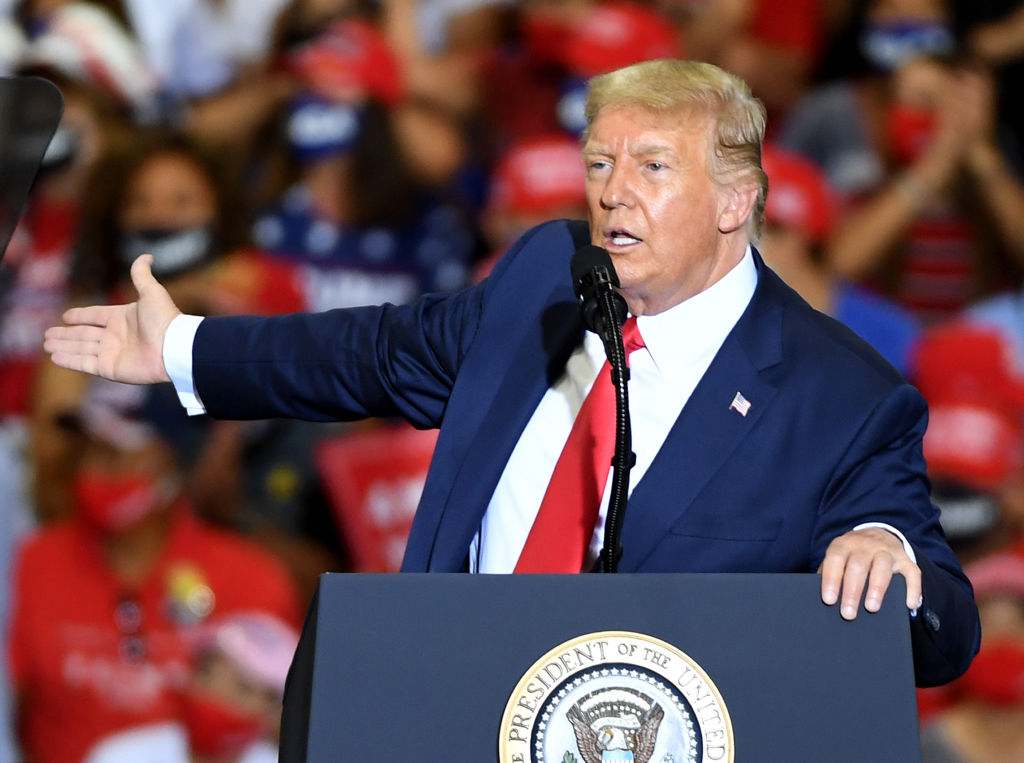Why the post-Nixon era shouldn't inform the post-Trump era


A free daily email with the biggest news stories of the day – and the best features from TheWeek.com
You are now subscribed
Your newsletter sign-up was successful
New York's Jonathan Chait argues that President Trump should be tried for his alleged crimes whenever his presidency ends, even if it sparks a political crisis.
His reasoning stems, in part, from the fact that former President Gerald Ford pardoned his predecessor, former President Richard Nixon, after he resigned in 1974 over the Watergate scandal. Chait notes Ford's ultimate legacy was that of statesman who helped the country move on from Nixon's scandals.
Should the Democratic nominee, former Vice President Joe Biden, defeat Trump this November, he'll need to execute a similarly peaceful transition of power, Chait writes, and will likely "be tempted to offer a pardon" to Trump "as a gesture of magnanimity." In Chait's view that would allow Biden to create some form of social peace, while freeing his administration up "to use all his partisan chits on substantive policy."
The Week
Escape your echo chamber. Get the facts behind the news, plus analysis from multiple perspectives.

Sign up for The Week's Free Newsletters
From our morning news briefing to a weekly Good News Newsletter, get the best of The Week delivered directly to your inbox.
From our morning news briefing to a weekly Good News Newsletter, get the best of The Week delivered directly to your inbox.
But Chait goes on to make the case that Ford's decision to remove the burden of Nixon's crimes from the United States' proverbial shoulders eventually led to Trump's 2016 victory and left post-Nixon reforms — like establishing inspectors general offices and barring the attorney general from political prosecutions — "in ruins" under the Trump administration. Meanwhile, Chait notes Roger Stone committed crimes to help Trump get elected in 2016 and was subsequently pardoned by the president. Chait suggests if Nixon "had faced prison" people like Stone wouldn't have "set out to elect a crook" and Trump would not have "gleefully mimicked so many" of Nixon's crimes. "If Trump isn't persecuted, what will his successors do?," Chait asks. Read more at New York.
A free daily email with the biggest news stories of the day – and the best features from TheWeek.com
Tim is a staff writer at The Week and has contributed to Bedford and Bowery and The New York Transatlantic. He is a graduate of Occidental College and NYU's journalism school. Tim enjoys writing about baseball, Europe, and extinct megafauna. He lives in New York City.
-
 6 of the world’s most accessible destinations
6 of the world’s most accessible destinationsThe Week Recommends Experience all of Berlin, Singapore and Sydney
-
 How the FCC’s ‘equal time’ rule works
How the FCC’s ‘equal time’ rule worksIn the Spotlight The law is at the heart of the Colbert-CBS conflict
-
 What is the endgame in the DHS shutdown?
What is the endgame in the DHS shutdown?Today’s Big Question Democrats want to rein in ICE’s immigration crackdown
-
 Rubio boosts Orbán ahead of Hungary election
Rubio boosts Orbán ahead of Hungary electionSpeed Read Far-right nationalist Prime Minister Viktor Orbán is facing a tough re-election fight after many years in power
-
 Key Bangladesh election returns old guard to power
Key Bangladesh election returns old guard to powerSpeed Read The Bangladesh Nationalist Party claimed a decisive victory
-
 Epstein files topple law CEO, roil UK government
Epstein files topple law CEO, roil UK governmentSpeed Read Peter Mandelson, Britain’s former ambassador to the US, is caught up in the scandal
-
 Iran and US prepare to meet after skirmishes
Iran and US prepare to meet after skirmishesSpeed Read The incident comes amid heightened tensions in the Middle East
-
 EU and India clinch trade pact amid US tariff war
EU and India clinch trade pact amid US tariff warSpeed Read The agreement will slash tariffs on most goods over the next decade
-
 Israel retrieves final hostage’s body from Gaza
Israel retrieves final hostage’s body from GazaSpeed Read The 24-year-old police officer was killed during the initial Hamas attack
-
 China’s Xi targets top general in growing purge
China’s Xi targets top general in growing purgeSpeed Read Zhang Youxia is being investigated over ‘grave violations’ of the law
-
 Panama and Canada are negotiating over a crucial copper mine
Panama and Canada are negotiating over a crucial copper mineIn the Spotlight Panama is set to make a final decision on the mine this summer
